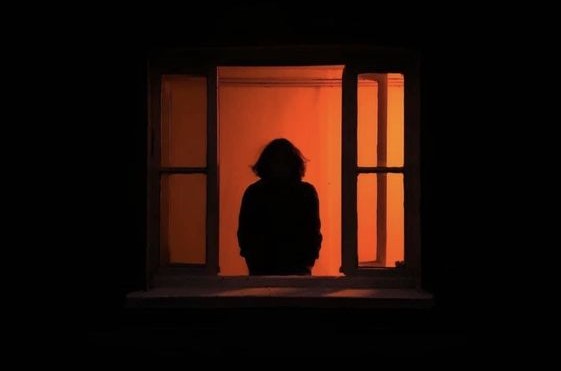She postponed looking at her grandmother till last, dwelling on all that surrounded the coffin, all that was familiar to her: a polished harmonium smelling of sawdust; a Bible, the edge of its closed pages broad-brushed in gold; twenty-five black-bordered cards of condolence; a vase of chrysanthemums, and a thrusting Amaryllis in a world of its own; a bad drawing of Hercules struggling with a boulder; sheet music in a pile, topped by a transcription for organ of Ketelby’s In A Monastery Garden; a fireplace, bare and uneasy; a coal-skuttle, its brass fleur-de-lys buffed to a spectre; the curtains drawn, but the light not to be denied; the bed gone (where?); the furniture – not a lot, it had to be said – banished to the margins; a central catafalque, its trestles from the Methodist schoolroom, their immodest legs draped with purple stitched by the Womens’ Guild.
And the coffin – Harrison’s economy line even though paid for by a millennium of weekly deposits of coins at the Wesleyan Methodist Death Club, which is what they called it (the ‘Death Club’ bit), presided over on Saturday mornings by a grim exchequer.
And Granny Smith (Stop it!), vein-bound hands on heart, shrunk even more since death, it seemed, reminding her of a wren she once rescued, too late, from the jaws of the cat and which she placed, its eyes closed and its beak still globuled with black blood, upturned on a piece of lint and covered with a lint blanket before a burial in a shoebox accompanied by the Lord’s Prayer she’d learned at Sunday School, helped by her father, spreading his huge shadow across the proceedings and, at her back, whispering – or, when she hadn’t caught his prompts, saying out loud – the parts she couldn’t remember.
And her laugh, a smack-lipped titter at first, causing a splutter (titter, splutter) from Uncle Simeon, perpetrator of the most tasteless With Sympathy card ever and who’d been delegated to cushion her shock of seeing a human corpse for the first time but who really wanted to marvel again at the way he’d included, within the funereal border of his home-made rectangle of folded A6, those penny-size cameo photos of himself, Aunty Joyce and the frightful twins, Matthew and Mark, her cousins, as though they were mouthing the words he’d made up and inscribed inside with his less-than-immaculate copperplate. All the rest cheap shop stuff then, written by a drudge and read by zillions across the globe; but not his – his was thought out, unique. She pictured him at his desk, chewing his Biro and looking up like an ecstatic St. Jerome at the bubble above his head and seeing the following words parachute into it:
So sorry for your lose
There’s little more to say
Just keep in mind
You’ll see each other on some other day
She’d had to look again. It was definitely ‘lose’, not ‘loss’. So much for fancy DIY handwriting. Anyway, he’d dropped the card when she started giggling.
What are you doing? You musn’t laugh. No, don’t laugh. It’s a disgrace. Stop laughing. (This whispered) For Christ’s sake, will you stop it?
And then he realised his opportunity, never to be missed, for handling female flesh, the fact that she was a well-developed sixteen but still a child encouraging the tentacular motion of his mitts and accounting for his admonition and his blasphemy and his faux-solicitude. But she couldn’t help it. The more he groped/comforted, the more she sniggered. Uncle Simeon, her mother’s brother, gone up in the world.
Aunty Joyce, wondering what was going on but ever-suspicious, ever-forgiving, pokes her head around the door and beckons him out.
So there she was, left alone in the front room of mourning, her grandmother’s rinsed hair-do still growing, perhaps a millimetre since she was laid out by old Harrison and his son, this son slightly dim and not to be trusted, so it was said by the gossips, with any cadaver, whatever that meant.
But it probably meant something ghastly like the story put about that Mr Akash Rahman of the Taj Mahal was importing frozen skinned cats, each in a plastic bag, like stiff miniature suckling pigs, and using them as the main ingredient of his Chicken Makkhani; not that any of his customers complained, least of all the ones chucked out of the pubs and sitting at midnight with their heads and their outstretched left arms flat out on the Taj Mahal tables like students taking their GCSEs, a pint of lager their reward for completing the paper.
She saw them the night Mohammed Rahman took her back to the Taj after the end-of-year ball, when Mr Rahman had promised to collect them in his car and drive her home but had to stop off at the Taj first to make sure there were no drunks making trouble. Which reminded her that she and Mohammed had talked ‘twixt bops about Mr Hill, the English teacher, who’d read them a story at the after-school Book Club by a South American writer called Gabriel Garcia Marquez about an exhumed grave and a stone sarcophagus full of the twelve-feet long red hair of the beautiful young woman inside, by then of course a skeleton covered in parchment just about resembling the skin and the facial features it once was but not much and certainly flaking off in bits if you so much as blew on it.
Should she touch Granny Smith now that she was alone with her?
She touched Granny Smith.
Touched the tip of her nose. Neither cold nor warm, it was covered in fine powdered hairs and it left a smudge on her fingertip, the print left when you picked up a Cabbage White tweezerlike before letting it fly off, damaged, towards the rest of its short life, three-quarters of a day maybe. What if she was really sleeping, not dead at all but in a coma like the drowned fisherman in a film she saw who was about to be taken away to the funeral parlour when he coughed up a fountain of salt water, sprang into a sitting position and wanted to know what the fuck the celebration was about. Judi Dench was in it. And Kevin Spacey.
She imagined Granny Smith waking up an hour or two after the sexton had filled in the grave and taken away his roll of naff false grass, then tapping on the roof of the coffin as best she could in the circumstances, and the sound not going anywhere, certainly not to the world above, which was a coffin-lid-shaped blue area wormed by aeroplane trails and crossed by birds and those insects that stopped a few seconds to tread air before zooting off somewhere else.
Then Hercules caught her eye. He was drawn by Uncle Biff who was a bachelor but he’d got the boulder all wrong so that although it was Hercules carrying it and therefore it could weigh anything, even Hercules couldn’t have supported it the way Uncle Biff had placed it, mostly on the back of Hercules’s head and overhanging it by about three hundred tons. But Uncle Biff couldn’t see it was wrong any more than he could go up to a woman and ask her out, not that any woman would want to go out with a man called Biff Smith who wore bracers as well as a leather belt and did impressions of George Formby with an air ukulele.
Thing was, she was preggers and Mohammed was the dad. She hadn’t told her parents yet. But she’d told her gran, who’d stopped believing in the Good Lord when her first-born had died at fourteen after running about in the damp rheumaticky gloaming. Gran had dropped her head to one side and smiled at her. ‘It’ll be a little smokey ‘un, then’ she’d said, reaching out to touch her shoulder as though giving her blessing to this mixed-race botch, as though she’d given birth to a pea-pod of them herself. And two days later Gran had collapsed in a heap outside Vernon’s the butchers, being dragged inside, felt hat awry, by Vernon junior so that she looked as though she’d been sweating blood in her armpits.
OMG. The world was so confusing and crazy. She’d done Grade 4 piano so she wondered what In a Monastery Garden sounded like. You had to foot the harmonium, its pedals just about covered in threadbare carpet squares. Bent her knee, pressed, and kept pressing. It gasped into life. She picked out the tune with her right hand. Her left sidled up to it with some chords.
And round the door one after the other their heads appeared, like in a musical – her mother and father, Uncle Simeon, Aunty Joyce, Matthew and Mark, each of their mouths an O, as though they were a choir singing.
She hadn’t meant to laugh. Anyway, it wasn’t a laugh. She was hysterical, uptight. Which is what Michelangelo Biff called her when she did anything funny or out of the ordinary. You’re bloody hysterical! A tear dropped on the organ’s yellowed ivories.
And she wondered how big it was now; grown another nanometre maybe, like her gran’s hair, its revolting grey rising up against Serenity Salon’s revolting caramel.





